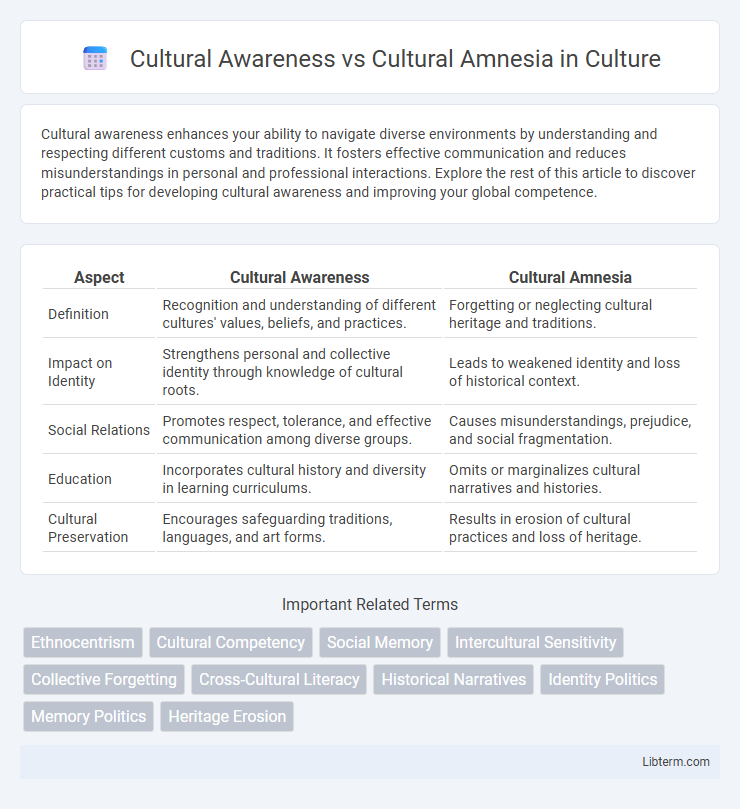Cultural awareness enhances your ability to navigate diverse environments by understanding and respecting different customs and traditions. It fosters effective communication and reduces misunderstandings in personal and professional interactions. Explore the rest of this article to discover practical tips for developing cultural awareness and improving your global competence.
Table of Comparison
| Aspect | Cultural Awareness | Cultural Amnesia |
|---|---|---|
| Definition | Recognition and understanding of different cultures' values, beliefs, and practices. | Forgetting or neglecting cultural heritage and traditions. |
| Impact on Identity | Strengthens personal and collective identity through knowledge of cultural roots. | Leads to weakened identity and loss of historical context. |
| Social Relations | Promotes respect, tolerance, and effective communication among diverse groups. | Causes misunderstandings, prejudice, and social fragmentation. |
| Education | Incorporates cultural history and diversity in learning curriculums. | Omits or marginalizes cultural narratives and histories. |
| Cultural Preservation | Encourages safeguarding traditions, languages, and art forms. | Results in erosion of cultural practices and loss of heritage. |
Understanding Cultural Awareness: Definition and Importance
Cultural awareness refers to the recognition and appreciation of the diverse cultural backgrounds, beliefs, and practices that shape individuals and communities. It fosters empathy, reduces prejudices, and enhances effective communication in multicultural settings. Understanding cultural awareness is essential for promoting inclusivity and collaboration in increasingly globalized societies.
Cultural Amnesia: Meaning and Modern Manifestations
Cultural Amnesia refers to the loss or forgetting of collective memories, traditions, and historical knowledge that shape a society's identity. Modern manifestations include the widespread neglect of indigenous histories, erasure of minority narratives in education, and diminished transmission of cultural practices due to globalization and digital distractions. This phenomenon leads to weakened cultural continuity and challenges in preserving diverse heritage in contemporary societies.
The Roots of Cultural Amnesia in Society
Cultural amnesia in society stems from systematic neglect of historical education and widespread media prioritization of contemporary narratives over ancestral knowledge. This erasure often results in loss of cultural identity and disconnect from important traditions, values, and collective memories. Institutions that fail to preserve or teach diverse heritages contribute significantly to this phenomenon, deepening societal gaps in cultural awareness and understanding.
The Role of Education in Fostering Cultural Awareness
Education plays a crucial role in fostering cultural awareness by integrating diverse histories, languages, and traditions into the curriculum, promoting empathy and inclusivity among students. Schools that emphasize multicultural education enable learners to understand global perspectives, challenge stereotypes, and reduce cultural amnesia--the loss or neglect of cultural history and identity. Through experiential learning, dialogue, and critical thinking activities, education cultivates respect for cultural diversity and equips individuals to navigate and contribute positively to an interconnected world.
Media Influence: Shaping Awareness or Promoting Amnesia?
Media influence significantly shapes cultural awareness by disseminating diverse narratives and promoting cross-cultural understanding, yet it can also foster cultural amnesia by selectively omitting or distorting historical contexts and marginalized voices. News outlets, social media platforms, and entertainment industries play pivotal roles in framing cultural identities and collective memories, impacting public perception and historical consciousness. The balance between promoting awareness and perpetuating amnesia depends on editorial choices, representation accuracy, and the inclusion of multiple cultural perspectives in media content.
Cultural Awareness and Identity Preservation
Cultural awareness plays a crucial role in identity preservation by fostering a deep understanding and respect for diverse traditions, languages, and social norms. Emphasizing cultural awareness in education and community practices strengthens collective memory and safeguards indigenous knowledge from erosion. This conscious engagement helps communities maintain their unique cultural identities amid globalization and rapid social change.
Impacts of Cultural Amnesia on Communities
Cultural amnesia erodes community identity by severing connections to shared history, traditions, and values, leading to a loss of collective memory that weakens social cohesion. This disconnection often results in diminished cultural pride and misunderstandings among community members, impeding effective communication and collaboration. The long-term impacts include reduced resilience in facing social challenges and the potential disappearance of unique cultural practices, which limits diversity and innovation within society.
Bridging the Gap: Strategies to Prevent Cultural Amnesia
Bridging the gap between cultural awareness and cultural amnesia requires intentional strategies such as incorporating intercultural education, preserving oral histories, and promoting inclusive community engagement. Utilizing digital archives and storytelling platforms ensures the transmission of cultural knowledge across generations, reducing the risk of cultural erosion. Empowering marginalized groups to share their narratives fosters collective memory and strengthens cultural identity, supporting long-term cultural sustainability.
Globalization: Threat or Catalyst for Cultural Awareness?
Globalization acts as a catalyst for cultural awareness by facilitating cross-cultural exchange, promoting diversity, and expanding access to global traditions and knowledge. However, it can also contribute to cultural amnesia when dominant cultures overshadow local customs, leading to the erosion of unique cultural identities. Balancing global interconnectedness with the preservation of indigenous heritage remains essential to harness globalization's potential without compromising cultural diversity.
Moving Forward: Building a Culturally Conscious Future
Building a culturally conscious future requires prioritizing cultural awareness by recognizing and valuing diverse histories, traditions, and perspectives. Embracing cultural awareness combats cultural amnesia, which risks erasing critical narratives and identities over time. This proactive engagement fosters inclusive communities, informed decision-making, and sustainable social progress.
Cultural Awareness Infographic

 libterm.com
libterm.com